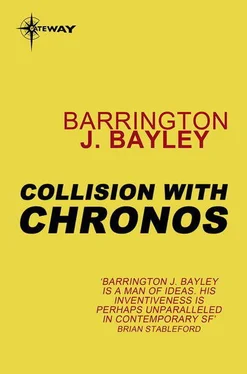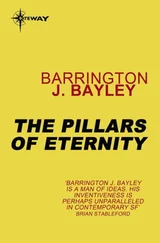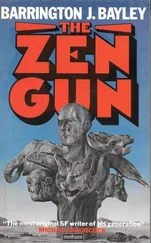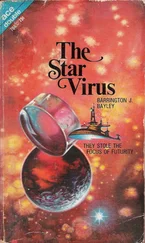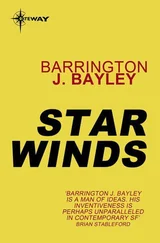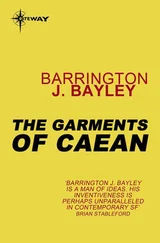Ascar let out a long, howling scream. Pain — Pain — Pain.
Then the room collapsed and was replaced by something indefinable. Ascar became aware of his nervous system as a skein, or network, floating like a rambling cloud, without tangible form, drifting through a multidimensional maze. Nothing was recognisable any more, and neither was there any proper sense of time. But his nerves, perhaps because the intruding time field had compromised their chemical functioning, were signalling pain: agonising, sharp, irresistible.
And into his consciousness was intruding something that, it seemed, was imminently going to end that consciousness. Thump, thump, thump, it went, like a living heart, or like a hammer that had his soul on the anvil.
Around him, his surroundings seemed to crystallise into some sort of form for a few moments. He saw more than the room in which he’d been seated: he saw a whole section of Retort City, deformed into bizarre non-Euclidean geometries so that its walls were no longer impediments to vision. Trapped in that nightmare were thousands of people, themselves transformed beyond semblance of humanity, like flies in a sticky jungle of spider-web: protruding through walls, floors and ceilings, combined with pieces of furniture, broken up into fragments of bodies still connected by long threads that were drawn-out nerves.
Then the city was on the move again, folding, distorting, sliding together like some shapeless, living monster from the ocean’s ooze.
Shiu Kung-Chien, watching a monitor of the tapes on a small screen set into the sphere’s pedestal, chose that moment to cut the playback, before there was any risk of Ascar suffering psychosomatic damage.
He switched on the sphere’s internal light and opened the hatch. Leard Ascar staggered forth, his face haggard and his breath coming in gasps.
“I think that will do,” Shiu said mildly. “It gets worse, but we don’t want to make a psychiatric case out of you.”
“It gets worse?”
“Yes. What you experienced were the effects of the initial approach of an alien time field. By the time it was all over our population had actually been decimated. We might not have got off so lightly, had the Oblique Intelligence itself, being also able to manipulate time, not taken steps to alter its direction.”
Ascar hung onto the edge of the hatch. “And this is what it’s going to be like in Earth?” he wanted to know.
“Oh, on your planet it will be incomparably worse than anything that happened here. Ours was merely a glancing blow, scarcely more than a close passage. What it will be like for you is scarcely conceivable.”
“Holy Mother Earth!” whispered Ascar hoarsely.
Hwen Wu’s cabinet ministers sat gazing impassively at the two Earthmen, their expressions mild, faintly supercilious. Rond Heshke found this detached look, which the people of Retort City invariably wore, somewhat unnerving. It was as if they weren’t really interested in one at all.
“So you understand, I hope, the situation that faces your planet,” Hwen Wu said calmly, conversationally, as though he were discussing how they might spend an idle hour or two. “We in Retort City have been aware of it for some months, ever since Shiu Kung-Chien made a chance survey in that direction. That’s why we put a space-timeship in orbit around Earth to make detailed observations.”
“How come our people never detected your ship?” Ascar asked sharply. “Our tracking stations keep watch on the whole solar system.”
“Its orbit was elliptical in time, I believe,” the Prime Minister told him, “swinging not only around the planet in space but also from the past to the future and from the future to the past. Your surveillance stations would never have picked it up.”
“Ingenious,” Ascar murmured to himself.
Hwen Wu continued. “Recently we decided to offer Earth what assistance we could afford. For this, since we’re racially unacceptable to your ideology, we needed emissaries your government would trust. That explains your presence here in Retort City: our observers watched your tragic journey through non-time and decided you’d be most suitable. You’re both eminent personages on Earth and were already to some degree acquainted with the facts.”
“What is it you want us to do?” asked Heshke.
“Merely return to Earth and make representations to your government, advising them of the facts and the help we can offer.”
“And just what form of help is that?” Ascar demanded, frowning doubtfully.
“The only solution for your civilisation lies in the style of life we’ve adopted.” Hwen Wu said. “By that, I mean a life in space, lived in artificial cities. You must get off the planet before the disaster strikes.”
Heshke was aghast. “But that’s practically impossible. We can’t possible take everyone off!”
“Not everyone, true. But we’ll be able to help you. Our productive facilities are as great, if not greater, than those of your civilisation. We’re able to put our Production Retort – the lower half of our city – through cycles of time, so that it can go through several production periods where an Earth factory would go through only one.”
“We’ll show you how to construct your space cities,” an aged, venerable minister put in, “and add our resources to your own.”
Hwen Wu nodded in agreement. “The two time systems won’t meet for generations yet. We should be able to establish, perhaps, two hundred million people in space. It might even be greater, but” – he waved a hand negligently – “we’ll also be making a similar offer to the civilisation which unhappily is to be in collision with yours, and probably the Production Retort will be working to capacity.”
“Two hundred million people – that’s only a fraction of the population of Earth.”
“But enough to allow your culture to continue, surely. We’re motivated, in part, by a desire not to see interesting cultures destroyed needlessly.”
“Interesting cultures?” echoed Heshke in bewilderment. “But do you not realise that by the norms of my culture you are biological perversions? Freaks? And should be exterminated? And you want to help us? ”
“Your religious beliefs don’t influence us in any way,” replied Hwen Wu in his usual cold but cultivated voice. “We’re swayed by reason, by what’s possible, but not, I hope, by passion.”
“It won’t work,” said Ascar, an acid, final note in his voice. “The Titanium Legions just won’t hear of it. The Earth is a goddess to them. They won’t desert her in any circumstances.”
“I fear Ascar may be right,” Heshke sighed. “Is there no other way? You’re masters of time: can’t you do something to prevent the collision from taking place at all?”
“You ask the impossible,” Hwen Wu said. “We’re not masters to that degree! We’re able to control a time field large enough to cover this city, yes – but one so large and powerful as either of the two on Earth? It would be like trying to move the Earth itself. It that not so, Leard Ascar?”
“So Shiu Kung-Chien informs me,” complied Ascar dully.
“And what if my government does refuse?” Heshke asked.
Hwen Wu gave a small, delicate shrug. “Then that’s their affair. We’ll take no further interest.”
He rose to his feet and waved his hand, signalling a cybernetic servitor. The machine rolled to a flimsy screen door and slid the panel aside.
“You won’t return to Earth alone,” Hwen Wu said. “One of our people will come with you, naturally, as our liaison. If your mission is successful he’ll stay on Earth to help to coordinate our joint efforts.”
Читать дальше
